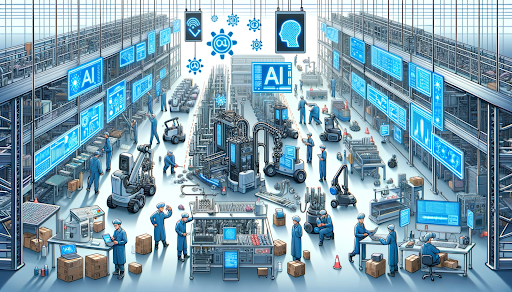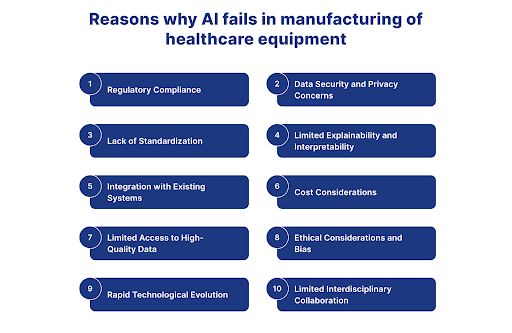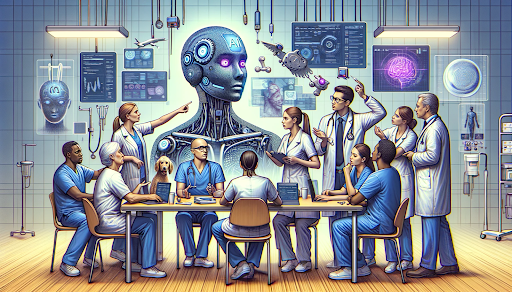10 reasons why AI fail in manufacturing Healthcare equipment
Posted by Hitul Mistry
/04 Jan 24
Tagged under: # ai, aiinhealthcare, healthcareindustry
A number of variables, including strict rules and technical difficulties, can be a reason for AI fail in manufacturing Healthcare equipment.
Introduction

- In healthcare, artificial intelligence (AI) has been applied recently, promising revolutionary improvements in patient care, diagnosis, and treatment. Nevertheless, there have been obstacles to implementing AI seamlessly in the healthcare equipment production process. A number of variables, including strict rules and technical difficulties, can be a reason for AI fail in manufacturing Healthcare equipment.
Reasons why AI fails in manufacturing of healthcare equipment

1.Regulatory Compliance
- The complicated regulatory environment surrounding the healthcare sector is one of the main obstacles AI must overcome to manufacture medical equipment. Balancing innovation and adherence to regulations set out by agencies like the FDA cannot be easy. Manufacturers face a complex web of regulations to ensure AI-powered products meet quality, safety, and effectiveness requirements because of this AI fail in manufacturing Healthcare equipment.
2.Data Security and Privacy Concerns
- The healthcare industry handles enormous volumes of private and sensitive patient data, which makes it sensitive by nature. Managing and analyzing large data volumes is necessary for integrating AI into industrial processes, which raises privacy and data security issues. AI-driven healthcare equipment development becomes more challenging due to the need to implement strong cybersecurity measures and ensure compliance with data protection requirements; because of this, AI fail in manufacturing Healthcare equipment.
3.Lack of Standardization
- One of the issues facing developers is the lack of common frameworks for AI in the healthcare manufacturing industry. In contrast to more developed businesses with well-established norms, the healthcare industry is currently developing its use of AI. Lack of consistency can cause interoperability problems, making it challenging for various AI systems to collaborate effectively. Because of this, AI fail in manufacturing Healthcare equipment.
4.Limited Explainability and Interpretability
- Particularly in deep learning, AI algorithms sometimes function as "black boxes," which make it challenging to understand how they arrive at particular conclusions. The lack of explainability and interpretability might impede the use of AI technology in producing healthcare equipment, where openness is essential for accountability and confidence. To guarantee patient safety, clinicians and regulatory agencies must thoroughly grasp how AI systems make judgments because of this AI fail in manufacturing Healthcare equipment.
5.Integration with Existing Systems

- Healthcare institutions often still use antiquated technology that might not work with contemporary AI. Technical difficulties arise when integrating new AI-driven hardware into pre-existing infrastructures; flawless communication and compatibility must be carefully considered. Manufacturers must invest in technologies that make incorporating AI into the more extensive healthcare system easier; because of this AI fail in manufacturing Healthcare equipment.
6.Cost Considerations
- Even though artificial intelligence (AI) has a lot of potential applications in healthcare, the upfront expenses of development, research, and implementation may be too high. Financial limitations are faced by manufacturers, particularly when creating equipment for specialised healthcare uses. The challenge is in striking a balance between the necessity of state-of-the-art AI technologies and affordability. because of this AI fail in manufacturing Healthcare equipment.
7.Limited Access to High-Quality Data
- Even though artificial intelligence (AI) has a lot of potential applications in healthcare, the upfront expenses of development, research, and implementation may be too high. Manufacturers face financial limitations, particularly when creating equipment for specialised healthcare uses. The challenge is striking a balance between the necessity of state-of-the-art AI technologies and affordability; because of this, AI fail in manufacturing Healthcare equipment.
8.Ethical Considerations and Bias
- The availability of high-quality, diversified datasets is a significant factor in the efficacy of AI models in developing healthcare equipment. Inadequate availability of thorough and representative data might make training and validating AI algorithms more difficult. Sometimes, data from various healthcare facilities may be siloed, making it difficult to develop reliable and broadly applicable models that serve a range of patient groups; because of this, AI fail in manufacturing Healthcare equipment.
9.Rapid Technological Evolution
- AI systems can unintentionally reinforce biases found in training data. Biassed algorithms can affect patient outcomes in the healthcare industry by causing discrepancies in diagnosis and treatment. To guarantee impartial and equitable medical equipment, manufacturers must prioritize ethical issues and aggressively seek to uncover and correct biases in both the training data and the algorithms themselves; because of this, AI fail in manufacturing Healthcare equipment.
10.Limited Interdisciplinary Collaboration
- Experts in data science, engineering, medicine, and other disciplines must work together to develop AI-powered medical devices. Insufficient multidisciplinary cooperation might hinder development as many stakeholders could have divergent goals and viewpoints. Creating efficient lines of communication and encouraging cooperation among specialists with different specialties is essential to overcoming the challenges presented by AI in healthcare manufacturing; because of this AI fail in manufacturing Healthcare equipment.
Conclusion
- The use of AI in the production of medical equipment has enormous potential to advance medical technology and enhance patient outcomes. But there are challenges along the way. Manufacturers, regulators, and healthcare providers must work together as stakeholders in the healthcare sector to overcome these obstacles. Tackling these problems will be essential to realizing AI's full potential in producing medical equipment and, eventually, raising the standard of patient care as technology advances.
How Digiqt will help you in implementing AI in your company
-
At Digiqt, we are dedicated to assisting companies in automating critical processes. Our highly skilled and professional team ensures the timely development and delivery of AI software. We commence by thoroughly understanding our client's specific requirements, and based on these requirements, our proficient team develops the AI software. Furthermore, we provide our clients with monthly updates on the software development progress.
-
Digiqt's commitment to automation, client-centric software development, and regular updates ensures efficiency and effectiveness in streamlining insurance operations..
Contact Us
About Us
We are a trusted, quality driven and value-driven digital product development company delivering services in BFSI sector.
Digiqt Technolabs is a passion turned into a company. We are a trusted product development company that specializes in turning your ideas into digital solutions utilizing our years of experience in industry-leading technologies.
We deliver high-tech innovations and great solutions for our clients in the most efficient manner regardless of the project complexity.
We are trusted, quality-driven and value-driven product development company.

Our key clients
Companies we are associated with
Our Offices

Ahmedabad
706,31FIVE Building,opp.Palladium, Corporate Rd, Makarba, Ahmedabad, Gujarat.
+91 99747 29554

Mumbai
WeWork, Enam Sambhav C-20, G Block,Bandra- Kurla Complex, MUMBAI-400051, Maharashtra.
+91 99747 29554

Stockholm
Bäverbäcksgränd 10 12462 Bandhagen, Stockholm, Sweden.
+46 72789 9039












